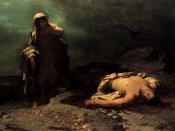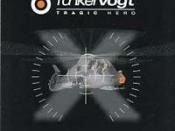A tragic hero in a play is a character who makes an error of judgment or has a fatal flaw that, combined with fate and external forces, brings on a tragedy. In Antigone Creon, the king of Thebes, is portrayed as the tragic hero. During the play Creon is forced to live, knowing that three
people are dead because of his ignorance, which is a punishment worse than death. Consequently, Creons arrogant pride, unescapable fate, and war within himself defines Aristotle's explanations of a tragic hero.
Throughout Antigone Creon is filled with arrogant pride and power, but his ego quickly deteriorates as he realizes the tragic outcome of his events. Creon displays arrogance when he is talking to Teiresias, claiming he has never failed in any of his duties, "there was never a time when I failed to heed it, father," 152.
Creon looks down on Antigone because she is a female.
He explains that he could never let a woman overrule a written law. Haughtiness is portrayed on Creon's part when Haemon told him it would be bad to sentence Antigone to death. Due to Creons superiority he thus punished Antigone, consequently shattering his ego when he realizes his son and wife have been killed and he is left with merely himself.
Creon has an unescapable fate, which when finally acknowledged it is too little to late. Before Antigone's death Teiresias the prophet comes to Creon in an attempt to stop the terrible fate that lay ahead. He tells Creon that the gods are unhappy. Teiresias tells him that a man who makes a mistake, and then corrects it, brings no shame on himself. Creon, being the impulsive ruler that he is, thus accuses Teiresias of being a greedy manipulator. Teiresias warns him...


